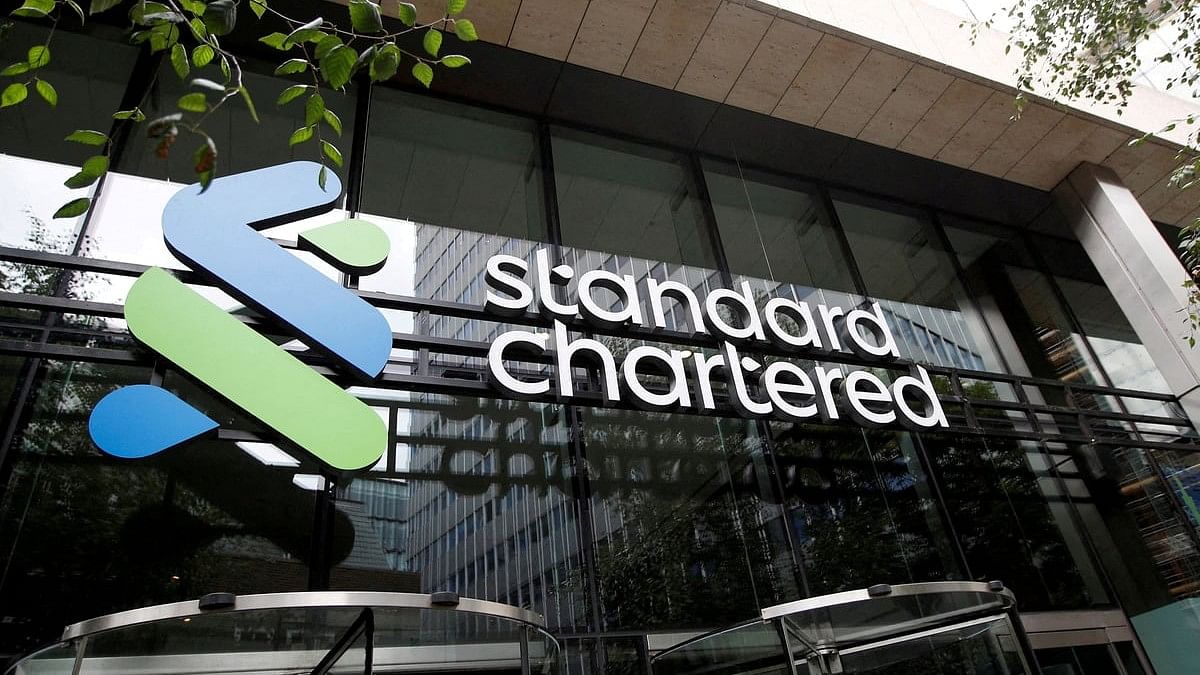
The Standard Chartered bank logo is seen at their headquarters in London, Britain.
Credit: Reuters Photo
UK-based Standard Chartered bank transacted over a $100 billion between 2008-2013 in breach of sanctions against Iran, and evaded prosecution in 2012 for funding "terrorist groups" after then chancellor in Lord Cameron’s government intervened the hearing in the court— state new documents filed in a New York court recently.
The documents were submitted by an independent counter-terrorist financing analyst David Scantling who according to a BBC report said the Standard Chartered Bank "has not admitted conducting transactions for “terrorist” organisations".
Scantling claims to have found that the bank did $9.6 billion foreign exchange transactions with companies and persons that the US Department of Defense (DoD) designated as funding "terror groups", including Hamas, Hezbollah, Taliban, and the al-Qaeda.
What is the Bank accused of?
In 2012, two whistleblowers including a former Standard Chartered executive identified as Julian Knight handed over the first evidence of the above transactions to the authorities in US.
The evidence is said to have been submitted in the form of spreadsheets which showed the Bank had falsified transaction data on Swift— an international payment system used by thousands of financial institutions - to move billions of dollars through its New York branch on behalf of sanctioned entities such as the Central Bank of Iran.
The Bank however issued a statement that said the US authorities "thoroughly discredited" the allegations by the whistleblowers.
After claiming to have stopped operations in Iran in 2007, Standard Chartered processed transactions for a bank fronting for the Central Bank of Iran, and this was when it was borrowing an average of $2bn a day from the Term Auction Facility, an emergency programme set up by the US government to support banks through the global financial crisis of 2007-2009.
“The newly extracted data simply cannot be reconciled with the government’s representations to the court in this matter that the [whistleblowers’ evidence] contains no evidence of undisclosed sanctions violations,” the Scantling says in his filing to the court.
The transactions include those of a Pakistani fertiliser company, Fatima Fertiliser, known for selling explosive materials that were used by the Taliban in roadside bombs that killed or maimed thousands of UK and US military personnel in Afghanistan.
Scantling also submitted that the Bank which is the Jersey sponsor for Liverpool FC, also facilitated 73 transactions for a Gambian front company owned by a key Hezbollah financier, Mohammad Ibrahim Bazzi.
Chancellor's letter to US top officials
Days after the details on the transactions were submitted, then chancellor to Lord Cameron's government— George Osborne is said to have written a letter on September 2012 to US authorities, including Ben Bernanke, then chair of the US central bank the Federal Reserve, and to then US president Barack Obama’s Treasury Secretary, Tim Geithner. He also met them the next month.
Two months later, the Bank was penalised with a fine of $300 million and escaped prosecution with a deferred prosecution agreement (DPA), a form of probation for corporations.
In the same month, Knight approached the US authorities with evidence that the bank’s misconduct was far worse than it had admitted and continued after 2007. The US Department of Justice however declined the prosecution of the Bank.
'US probe agencies got the case dismissed'
As the said transactions were probed, the Bank twice admitted to have breached the sanctions against Iran and other countries— first in 2012, and later in 2019, for which the Bank paid over $1.7 billion in fines. But, as per the whistleblowers— it did not accept involvement in transactions for "terrorist" outfits.
As per the Knight and another whistleblower (unnamed)— an FBI agent in 2019 claimed to a court that the spreadsheets with details of the transactions had nothing that "indicated or suggested the bank had engaged in improper US dollar transactions after 2007".
The whistleblowers also alleged that US agencies probing the matter applied to have the case dismissed. The agencies told the court that the allegations “did not lead to the discovery of any new … violations” after which the court dismissed the case as “meritless”.
Scantling's 'findings'
Scantling who has decades of experience dealing with counter-terrorist financing has also worked with the DoD which termed the above transactions by the Bank as 'funding terror groups'.
In his filing at the New York last Friday, Scantling pointed the spreadsheets contain records of over half a million separate transactions between 2008 and 2013 that were “cloaked”, meaning they were not immediately visible in the spreadsheets— but could be extracted through a simple technique well-known to analysts in his field.
This shows a frightening connection to not just commercial entities, but terrorist organisations, terrorist front companies for organisations such as Hamas, Hezbollah, al-Qaeda, the Taliban - things that make up a regulator's nightmare - and we didn't know that: it was never disclosed to us. And it wasn't apparent in the data that we had. It’s a whole different story.Daniel Alter, former general counsel at the New York Department of Financial Services
His submitted that in those spreadsheets are numerous transactions by Standard Chartered Bank, “with or on behalf of Iranian banks, Iranian companies and Middle Eastern money exchanges that, according to [the US government], finance designated foreign terrorist organisations”.